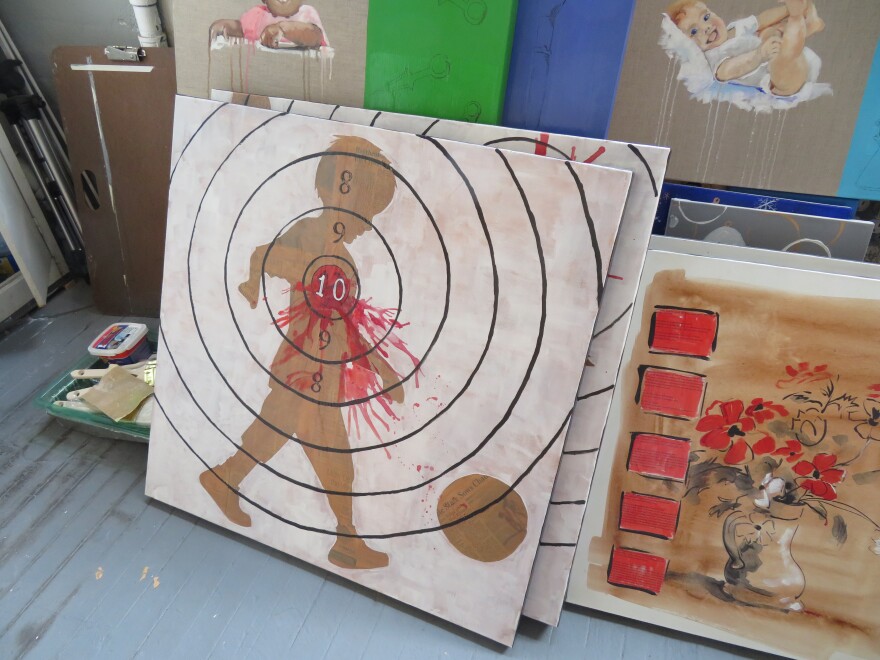At first glance, the painter Ada Koch and the poet Glenn North might seem an unlikely pair. But what has emerged from their collaboration — Love, Loss & Violence: A Visual Dialogue on War, an art exhibit opening this weekend at the Kansas City Artists Coalition and an accompanying book — illustrates with painful honesty that certain fears are universal.
Koch and North have spent the last year working together in response to violence in Kansas City and beyond. The two have known each other since their days serving on a grants committee at ArtsKC. One night at a fundraising event, Koch heard North read his poetry.
"It took my breath away," Koch remembers. "As I came back to my studio and started working, I thought, wouldn’t it be great to have the power of his poetry in combination with my paintings?"
Koch's work had evolved, in recent years, from an earlier style she describes as "very colorful, layered work in acrylics and oils, and pretty happy subjects: landscapes, bicycles, portraits of kids" to paintings directly in response to the vulnerability she felt after 9/11 and more intensely after the Boston Marathon bombings, which occurred near where her daughter was living.
So when North visited her studio, she showed him her "target" series: Children in a gun sight, with splattered blood.
While Koch was thinking about 9/11 and the Boston Marathon Bombings, North had been thinking about Trayvon Martin and Michael Brown. He says he was blown away the first time he saw Koch’s paintings of blood-splattered silhouettes of children in gun sights.

"I was disturbed," he says, "but it’s the kind of art that I’m drawn to. I knew there was definitely a statement being made here."
North, who is currently the official poet laureate of 18th and Vine, and former poet-in-residence at the American Jazz Museum, has written pieces in response to paintings before, including one at the Nelson-Atkins Museum of Art. His first collaboration with Koch was just over a year ago, at a fundraiser for KC Mothers In Charge, a group of mothers who have lost their children to violence in Kansas City.
Inspired by one of Koch's paintings depicting a mother holding a baby in crosshairs, North wrote the devastating "How to Mourn a Brown Boy," which begins:
Prepare while he is still alive.
Know that from the moment
your belly swelled with him
he was in the crosshairs.
Tell the boy to pull up his pants
to walk with purpose, pursue greatness
but know that it won’t protect him.
Fifty lines later, the poem ends with:
Become initiated into the sorority
no woman wants to belong to.
Know that tomorrow
it will be another mother’s son
inking the headlines.
Go to her. She will need you.
"How to Mourn a Brown Boy" received wide acclaim, and was published in The Kansas City Star and New Letters magazine.
"He said things very bluntly, and he put it right out there," Koch says, "and it was beautiful."
North says a poem doesn’t just complement a work of art – it can make a viewer see the a painting differently.
"Whatever you bring to it, you experience it that way," he notes. "And then you read the poem in conjunction with the piece and then there’s another groove in your brain that’s being stimulated, so to speak. Those things work in tandem to create a different experience."

North and Koch started meeting regularly, usually in Koch's studio above the Leedy-Voulkos Art Center in the Crossroads.
"I look at the paintings and what she’s working on, and I’m considering Ada and what she’s trying to accomplish when I sit down to write the poem," North says.
"It’s evolved to work both ways," Koch adds, saying she's painted images in response to lines from his poems.
Their just-published book is about the size of a glossy magazine. In addition to all-new paintings by Koch and eight poems by North, they've included excerpts of other famous poems and song lyrics.
"For historical context, it was important to bring quotations from songs from the 1960s, songs from 1918, snippets of poems from Walt Whitman and the Civil War," says Koch, who also incorporates art-historical references to war paintings such as Picasso's "Guernica," into her own work.
"We wanted that historical significance, but also to show the world-wide effects," Koch says. "So we have a quote from Gandhi: 'The enemy is fear. We think it is hate, but it is really fear.'"
Koch and North say the book could be used in schools, perhaps as a writing textbook — one of the prelims for the annual Louder Than A Bomb KC poetry slam competition is scheduled for March 9 at the Kansas City Artists' Coalition — and they hope to work with veterans' groups.
"If you can help somebody deal with pain, communicate a message that uplifts or challenges, then to me that’s the work," North says.
Love, Loss & Violence, March 3-31 in the Mallin Gallery at the Kansas City Artists Coalition, 201 Wyandotte Street, Kansas City, Missouri, 64105; 816-421-5222.
C.J. Janovy is an arts reporter for KCUR 89.3. You can find her on Twitter, @cjjanovy.





